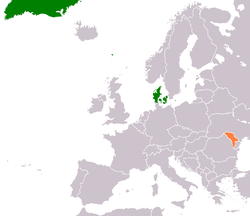Denmark–Moldova relations
 |
|
Denmark |
Moldova |
|---|---|
Denmark – Moldova relations refers to the current and historical relations between Denmark and Moldova. Neither country has a resident ambassador. The Moldovan Ambassador to Denmark is Igor Corman, who resides in Berlin and was appointed in 2005.[1][2] The Danish Ambassador in Moldova is Ole Harald Lisborg, who resides in Bucharest.[3]
The Republic of Moldova and the Kingdom of Denmark established diplomatic relations on January 20, 1992. The Kingdom of Denmark recognized the independence of Moldova on December 31, 1991. On 22 April 2009, a Danish House opened in Chisinau.[4][5]
State visits
Moldovan Minister of Foreign Affairs visited Denmark in June 1996, and Moldovan Foreign Minister paid a visit to Denmark in December 1997.[6] Danish politician Ruben Madsen visited Transnistria in November 2010.[7]
Trade
In 2008, Danish export to Moldova amounted 80 million DKK, and imports were under 1 million DKK.[8]
Political, technical and humanitarian assistance
The Ministry of Foreign Affairs of Denmark provides support for a Programme Against Human Trafficking in Moldava that also operates in Ukraine and Belarus. In Moldova, the program is implemented by the International Organisation for Migration and the La Strada International Association.[9][10]
The Danish government provided financial contributions to the Organization for Security and Co-operation in Europe fund which monitoring the withdrawal of Russian weapons and ammunition from Moldova's Dniester region.[11]
The technical assistance offered by Denmark to the Republic of Moldova includes especially projects in the sphere of environment (district of Edinet, Cahul, Tighina).[6] Denmark together with Sweden and the UN also provide financial assistance to the Moldovan parliament whose building and infrastructure were seriously damaged and largely ruined during the April 2009 post-election pogrom.[12]
Agreements
In 2004, The Moldovan parliament voted for the ratification of a Moldovan-Danish memorandum on implementation of the Kyoto Protocol under which Denmark committed itself to financing a series of projects aimed at reducing greenhouse gas emissions in Moldova.[13]
References
- ↑ "Moldova appoints ambassador to Denmark, Norway". BBC Monitoring. February 23, 2005. Retrieved 2010-06-30.
Also today, the government appointed Moldovan ambassador to Germany Igor Corman the Berlin-based Moldovan ambassador to Germany, Denmark and Norway. ...
- ↑ "Ambassadors in Denmark". 26 January 2009. Retrieved 6 February 2011.
- ↑ "Embassies in Romania". Bucharest Hotel Guide. Retrieved 6 February 2011.
- ↑ "First Danish House in Moldova". AllMoldova (AllMoldova). 4 May 2009. Retrieved 10 February 2011.
- ↑ "Danish house in Moldova". Retrieved 6 February 2011.
- ↑ 6.0 6.1 "Relations between Denmark and Moldova". Ministry of Foreign Affairs of Moldova. Retrieved 6 February 2011.
- ↑ "Danish diplomats visit Transnistria, meet officials". AllMoldova (AllMoldova). 10 November 2010. Retrieved 10 February 2011.
- ↑ Ministry of Foreign Affairs of Denmark. "Landefakta Moldova" (in Danish). Retrieved 22 December 2011.
- ↑ "Through the Neighbourhood Programme of the Ministry of Foreign Affairs, Moldova is assisted in fighting human trafficking.". Ministry of Foreign Affairs of Denmark. Retrieved 2010-07-01.
- ↑ "Danish Support For The Fight Against Human Trafficking In Moldova". Retrieved 1 June 2010.
- ↑ "President rejects top EU official's scepticism about Moldova's integration bid". TeleRadio-Moldova. 22 October 2002. Retrieved 11 February 2011.
President Vladimir Voronin has met the Bucharest-based Finish and Danish ambassadors to Moldova...
- ↑ "Denmark, Sweden and UN offer helping hand to Moldovan parliament". All Moldava. February 17, 2010. Retrieved 2010-06-30.
- ↑ "Moldova gives Denmark half of its greenhouse gas emission limit". BBC Monitoring. March 12, 2004. Retrieved 30 June 2010.
External links
- "Methane Gas Capture and Electricity Production at Chisinau Wastewater Treatment Plant, Moldova". United Nations Framework Convention on Climate Change. January 2004. Retrieved 6 February 2011.
| ||||||||||||||||||||||||||||||||||||||||
